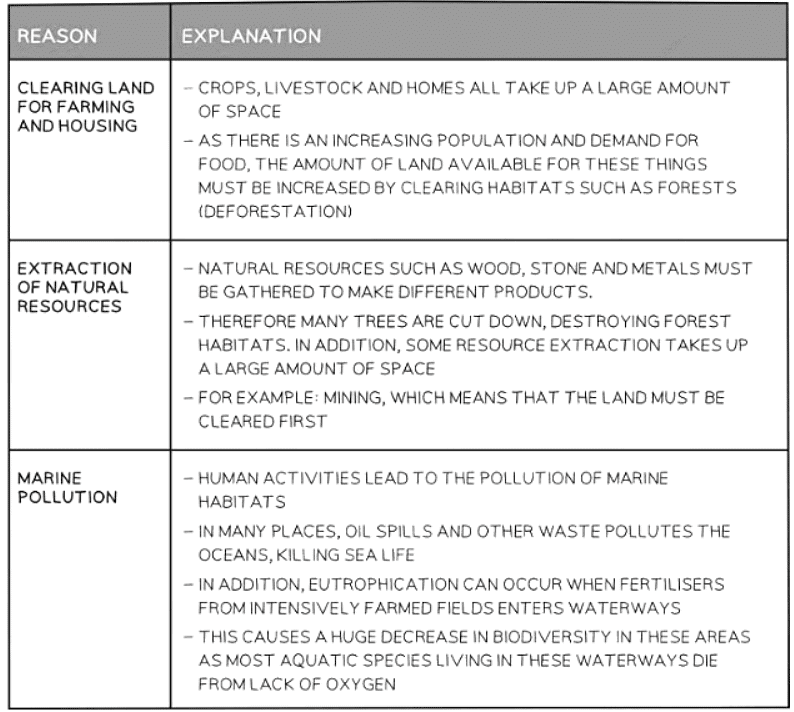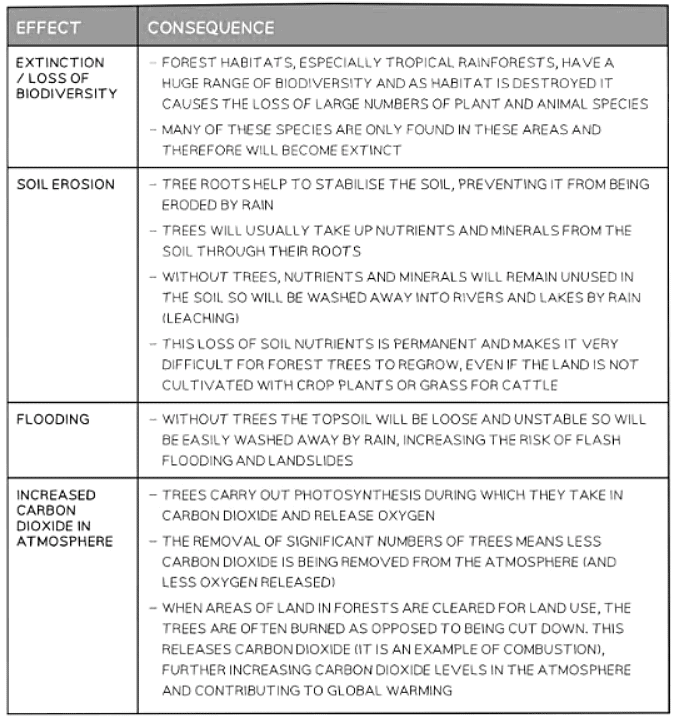Class 10 Exam > Class 10 Notes > Biology for GCSE/IGCSE > The Importance of Biodiversity
The Importance of Biodiversity | Biology for GCSE/IGCSE - Class 10 PDF Download
Human Pressures on Other Species
Biodiversity
- Is defined as the number of different species that live in a particular area.
- Human activities have tended to decrease biodiversity, while high biodiversity is crucial for stable ecosystems.
- Habitat destruction by humans is a significant factor leading to decreased biodiversity.
Reasons for Habitat Destruction
- The global increase in human population is leading to the devastation of various habitats, including rainforests, woodlands, and marine ecosystems.
- Human activities such as deforestation, pollution, and land conversion for economic purposes are major contributors to habitat destruction, resulting in a decline in biodiversity.
- This disruption in ecosystems leads to the collapse of food chains and webs, causing the extinction of species due to the depletion of their prey.
- The main reasons for habitat destruction include:

Question for The Importance of BiodiversityTry yourself: What is the main reason for habitat destruction, leading to a decline in biodiversity?View Solution
Deforestation
- Deforestation involves the large-scale clearing of trees, often leading to detrimental environmental impacts.
- When trees are replanted after clearance, it can be considered sustainable; however, this is not commonly practiced.
- The primary reasons for deforestation include land conversion for construction, livestock grazing, and the establishment of monocultures like palm oil plantations.
- The reduction in global forest cover results in severe environmental consequences, exemplifying habitat destruction.
- Undesirable outcomes of deforestation encompass species extinction, soil degradation, increased flooding, and heightened levels of atmospheric carbon dioxide.
The Impact of Environmental Changes
- Extinction: Extinction refers to the permanent loss of a species. When a species goes extinct, it is lost forever, disrupting the balance of ecosystems.
- Loss of soil: Soil is a vital resource for agriculture and ecosystems. When soil is lost through erosion or degradation, it affects food production and leads to desertification.
- Flooding: Flooding can result from various factors like heavy rainfall or human activities. It causes damage to infrastructure, displaces communities, and leads to loss of life.
- Increase of carbon dioxide in the atmosphere: The rise in carbon dioxide levels is primarily due to human activities like burning fossil fuels. This leads to global warming, climate change, and impacts biodiversity.

The document The Importance of Biodiversity | Biology for GCSE/IGCSE - Class 10 is a part of the Class 10 Course Biology for GCSE/IGCSE.
All you need of Class 10 at this link: Class 10
|
101 videos|193 docs|33 tests
|
FAQs on The Importance of Biodiversity - Biology for GCSE/IGCSE - Class 10
| 1. Why is biodiversity important in the ecosystem? |  |
Ans. Biodiversity is important in the ecosystem because it contributes to the stability of the ecosystem, provides a variety of ecosystem services such as pollination, nutrient cycling, and pest control, and increases resilience to environmental changes.
| 2. How do human activities impact biodiversity? |  |
Ans. Human activities such as habitat destruction, pollution, introduction of invasive species, and overexploitation of natural resources can significantly impact biodiversity by reducing the number of species in an ecosystem and disrupting the balance of the ecosystem.
| 3. What are the consequences of habitat destruction on other species? |  |
Ans. Habitat destruction can lead to loss of habitat for many species, resulting in decreased populations, reduced genetic diversity, and increased competition for resources. This can ultimately lead to extinction of species.
| 4. How can we help conserve biodiversity? |  |
Ans. We can help conserve biodiversity by protecting and restoring natural habitats, implementing sustainable practices in agriculture and fishing, reducing pollution, and raising awareness about the importance of biodiversity.
| 5. How does climate change affect biodiversity? |  |
Ans. Climate change can have a significant impact on biodiversity by altering habitats, affecting migration patterns, and increasing the frequency of extreme weather events. This can result in changes in species distribution and abundance, and ultimately lead to loss of biodiversity.
Related Searches




















